Who among the current First Presidency and Quorum of the Twelve is mostly likely to eventually become President of the Church?
Elder Bednar. He has a 55% chance. Here’s the complete list, ordered by probability of becoming President. Of course, President Monson ranks at the top since he already is President.
| Quorum Members’ Estimated Probabilities of Achieving Presidency, September 2009 | |||||
|---|---|---|---|---|---|
| Name…………. | Probability President | ..Rank.. | …..Age….. | Future Life Expect | Mean Yrs Pres if Pres |
| Monson | 1.00 | 1 | 82.1 | 7.5 | 7.6 |
| Bednar | 0.55 | 12 | 57.3 | 23.9 | 12.5 |
| Holland | 0.50 | 9 | 68.8 | 15.2 | 7.5 |
| Oaks | 0.48 | 5 | 77.1 | 10.0 | 4.9 |
| Packer | 0.41 | 2 | 85.0 | 6.3 | 3.2 |
| Uchtdorf | 0.32 | 11 | 68.8 | 15.1 | 6.8 |
| Andersen | 0.30 | 15 | 58.1 | 23.2 | 9.8 |
| Hales | 0.29 | 8 | 77.1 | 10.0 | 3.8 |
| Nelson | 0.23 | 4 | 85.0 | 6.3 | 2.4 |
| Ballard | 0.21 | 6 | 80.9 | 8.1 | 3.4 |
| Perry | 0.20 | 3 | 87.1 | 5.5 | 2.4 |
| Christofferson | 0.19 | 14 | 64.8 | 18.1 | 6.8 |
| Scott | 0.18 | 7 | 80.8 | 8.1 | 3.1 |
| Eyring | 0.15 | 10 | 76.3 | 10.4 | 3.6 |
| Cook | 0.14 | 13 | 69.0 | 15.0 | 5.3 |
In this table, “Rank” means order in seniority, and “Mean Yrs Pres if Pres” estimates the number of years each man would be President assuming he becomes President. For President Monson, this is an estimated number of future years as President, not counting the time he has already served in the position.
Where do these probabilities come from? Well, the answer is a little long and tedious, so to avoid boring most of you, I’ve put a description of my method at the end of this post, after all the fun stuff.
Looking at the table, the connection between age and life expectancy is probably clear, as well as the connection between age, rank, and probability of becoming President. Often a figure makes such connections clearer, though, so I put the data in a figure. But before I get to the figure for September 2009, let me give a little background in the form of figures based on similar data from the calling month of each new President going back to President McKay.
Here’s what the Quorum looked like when David O. McKay took over as President in April 1951.
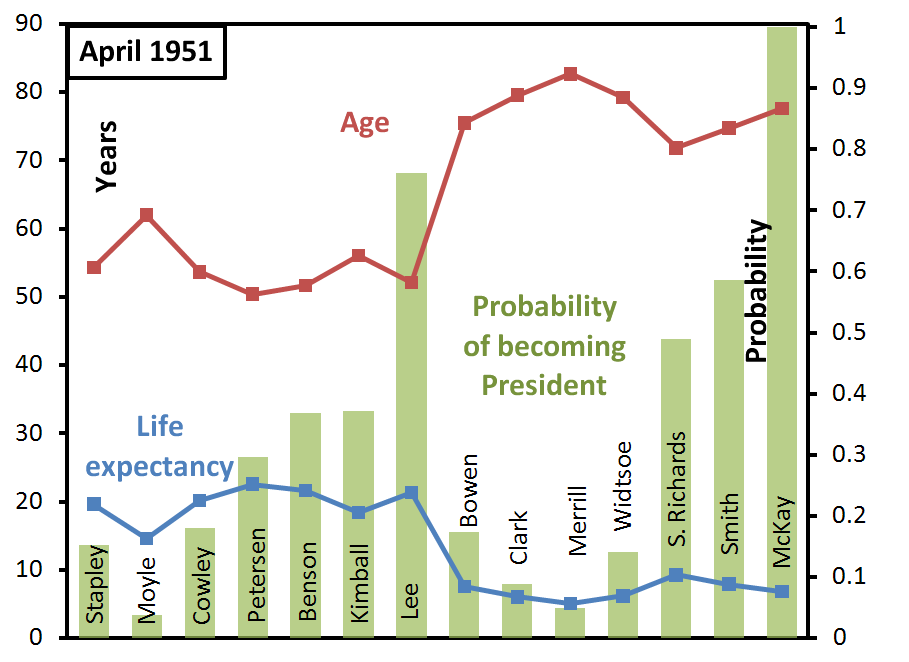
This is what the parts of the figure mean:
- Members of the Quorum are listed from least senior (most recently called) to most senior (called longest ago).
- The red dots (connected with lines to make them stand out more) represent age in years. Years are shown on the left vertical axis.
- The blue dots (also connected with lines) represent life expectancy in years, also measured along the left vertical axis.
- The green bars represent probability of becoming President. Probability values are shown on the right vertical axis.
President McKay of course had a probability of 1 (100%) of being President. Joseph Fielding Smith and Stephen L. Richards also had fairly good chances, which makes sense given that they were second and third in line, and both a bit younger than President McKay. But by far the best chance for any Quorum member was for Harold B. Lee, at nearly 70%. Why? Well, looking at the age points, he was 20 years younger than everyone senior to him, and so a really good bet to outlive them all.
Also worth noticing is the fact that the four Quorum members between Richards and Lee–John A. Widtsoe, Joseph F. Merrill, J. Reuben Clark, and Albert E. Bowen–had very little chance of reaching the Presidency. All were older than the three men ahead of them in seniority.
Finally, future Presidents Spencer W. Kimball and Ezra Taft Benson weren’t exactly unlikely candidates at this point, with chances of about 1 in 3, but it was only the surprisingly early death of Harold B. Lee that really gave them a good shot.
Okay, here’s the Quorum when Joseph Fielding Smith took over as President.
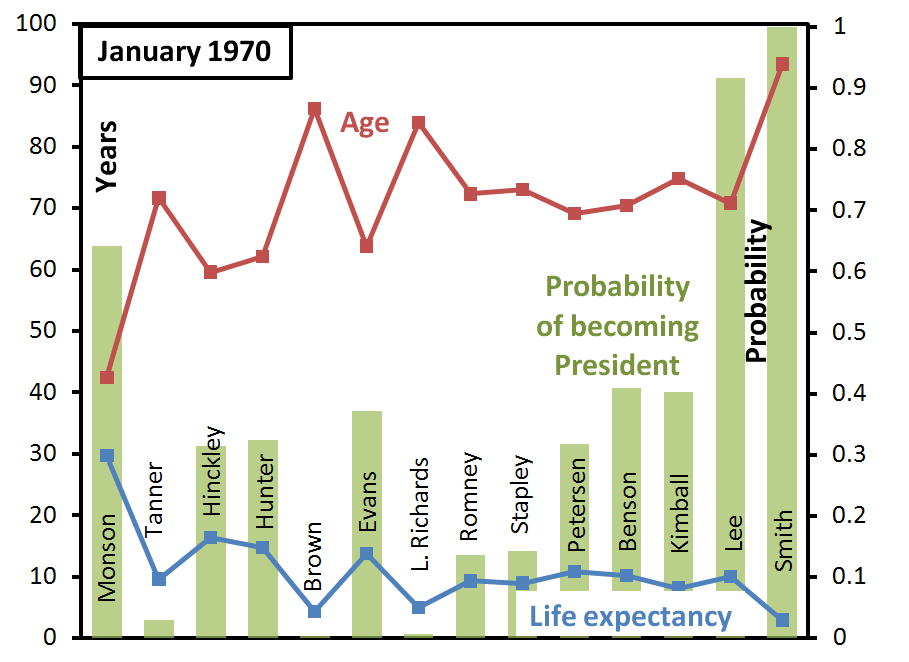
At this point, Elder Lee appeared to be a virtual lock for reaching the Presidency. Future Presidents Howard W. Hunter and Gordon B. Hinckley had joined the Quorum, and appeared to have fair chances to reach the Presidency. Richard L. Evans looked like a pretty good bet at this time, but he was to die at 65. Thomas S. Monson had joined the quorum by this time, and you can see like Harold B. Lee, he was so much younger than anyone senior to him that he appeared to be quite likely to end up as President.
Interestingly, there were three Quorum members at this time–LeGrand Richards, Hugh B. Brown, and N. Eldon Tanner–who had virtually no chance of becoming Church President.
Here’s the Quorum when Harold B. Lee became President.
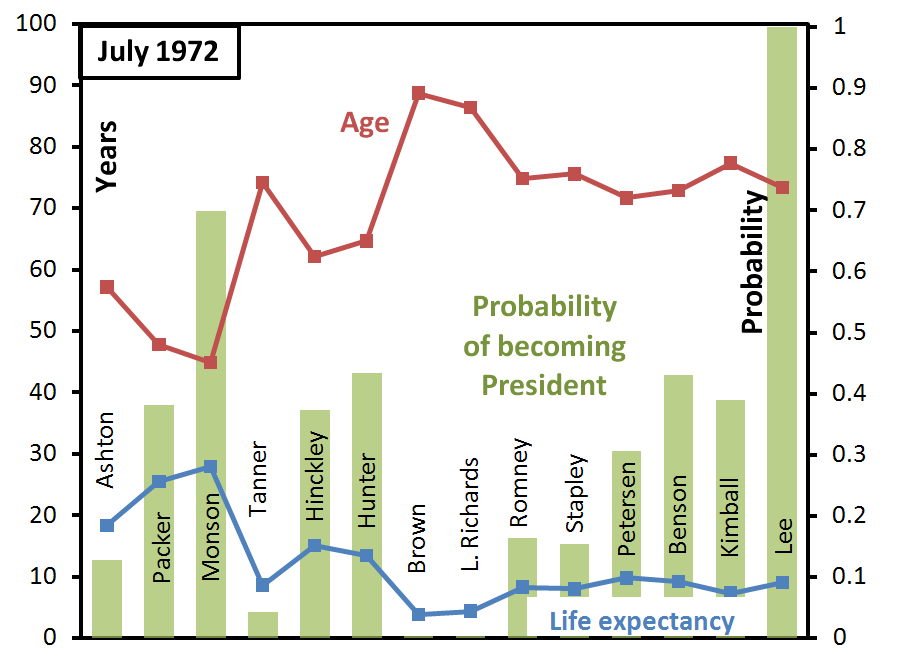
Not much changed during President Smith’s brief tenure.
Here’s the Quorum when Spencer W. Kimball took over as President.
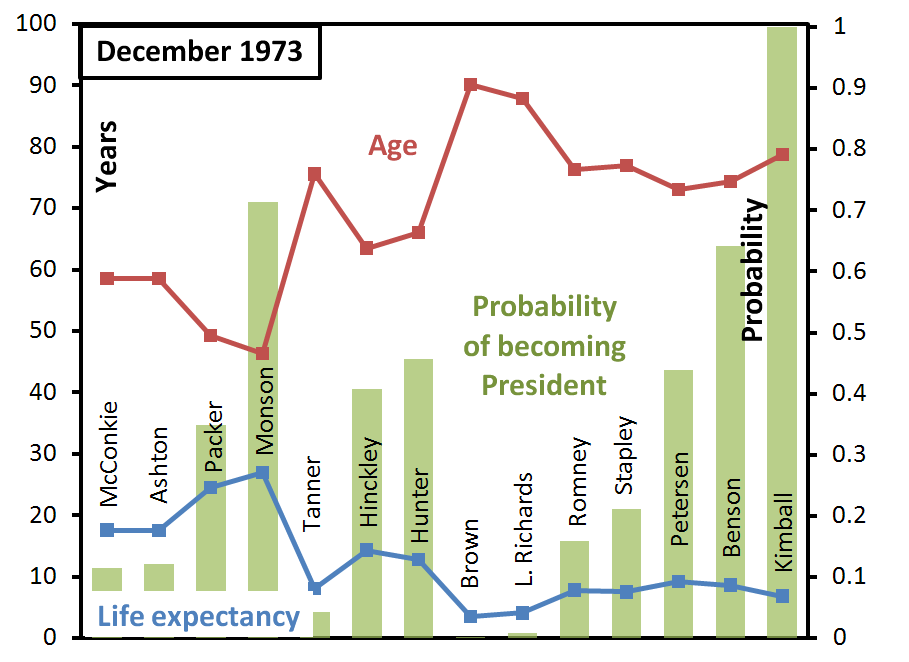
President Lee’s death really altered probabilities for some Quorum members following him. Most obviously, it allowed President Kimball, who was four years older than him, to become President. But it also bumped up probabilities for Elders Benson and Petersen, both of whom were only slightly younger than President Lee. Farther on down the Quorum, his death had less of an impact, as much younger Quorum members were already quite likely to outlive him.
Here’s the Quorum when Ezra Taft Benson became President.
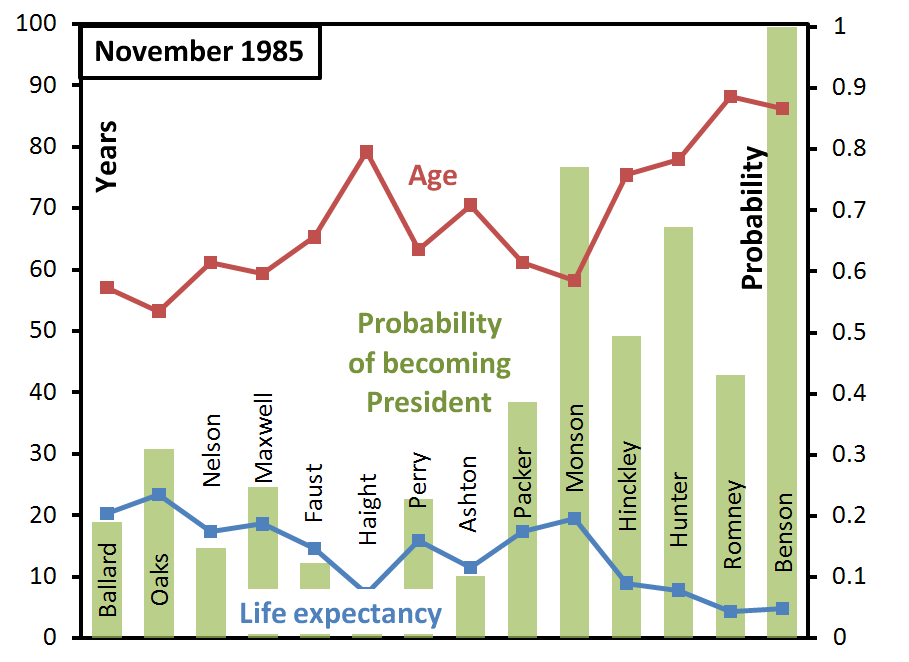
President Benson was followed in seniority by a cluster of Quorum members who were quite likely to become President too. Marion G. Romney was only a little older than President Benson, and Elders Hunter, Hinckley, and Monson were all quite a bit younger. Farther on down in the Quorum, David B. Haight had a near zero chance. Dallin H. Oaks, on the other hand, had entered the Quorum with a relatively good chance, as he was noticeably younger than anyone senior to him.
Here’s the Quorum when Howard W. Hunter became President.
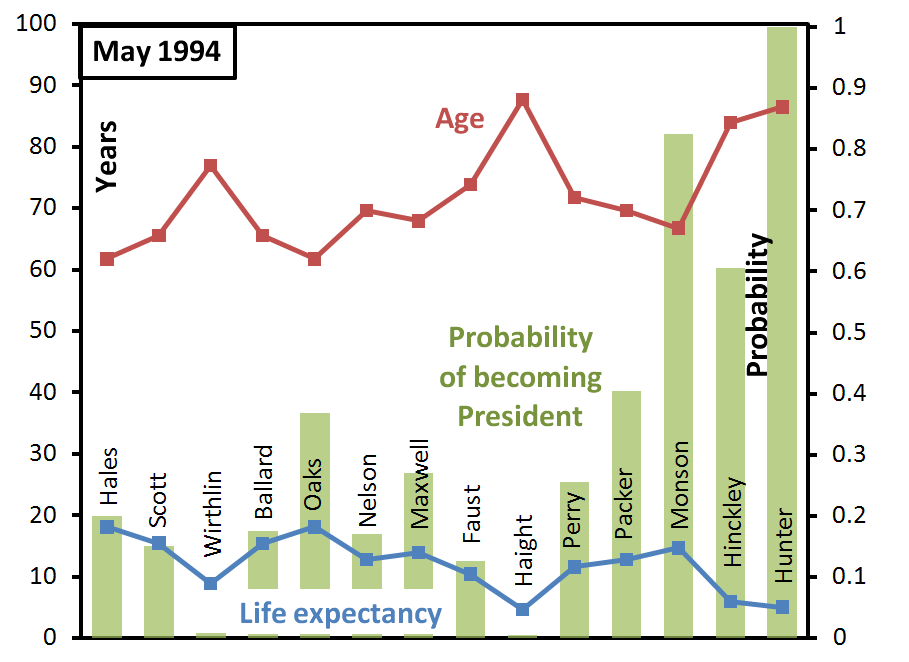
Future Presidents Hinckley and Monson were well positioned at this point. President Hinckley was only a little younger than President Hunter, but he was second in line and so had only to outlive one man. President Monson still had the advantage of being dramatically younger than anyone senior to him. Boyd K. Packer also began to emerge as a possible future President. He was (and is) older than President Monson, but had moved far enough up the ladder of seniority to be positioned to reach the Presidency if President Monson died young. Further on down in the Quorum, Elders Maxwell and Oaks stood out as likely candidates.
Here’s the Quorum when Gordon B. Hinckley became President.
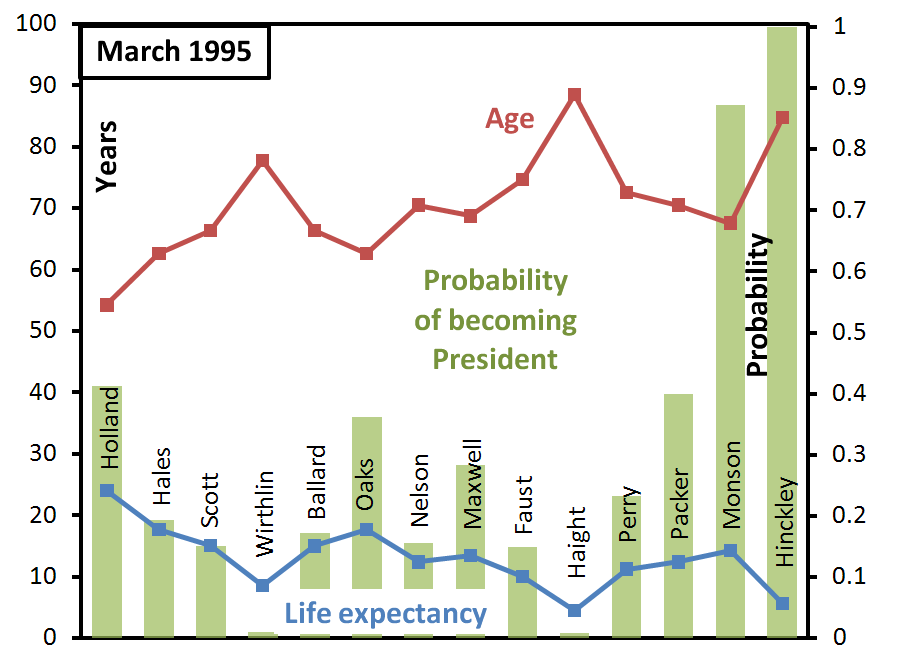
At this point, President Monson was pretty much a shoe-in to take over as the next President. At the junior end of the Quorum, Jeffrey R. Holland had entered with quite a high chance of becoming President. He had the same advantage as Elders Oaks, Monson, and Lee when they were called: he was quite a bit younger than anyone senior to him.
Here’s the Quorum when Thomas S. Monson took over as President.
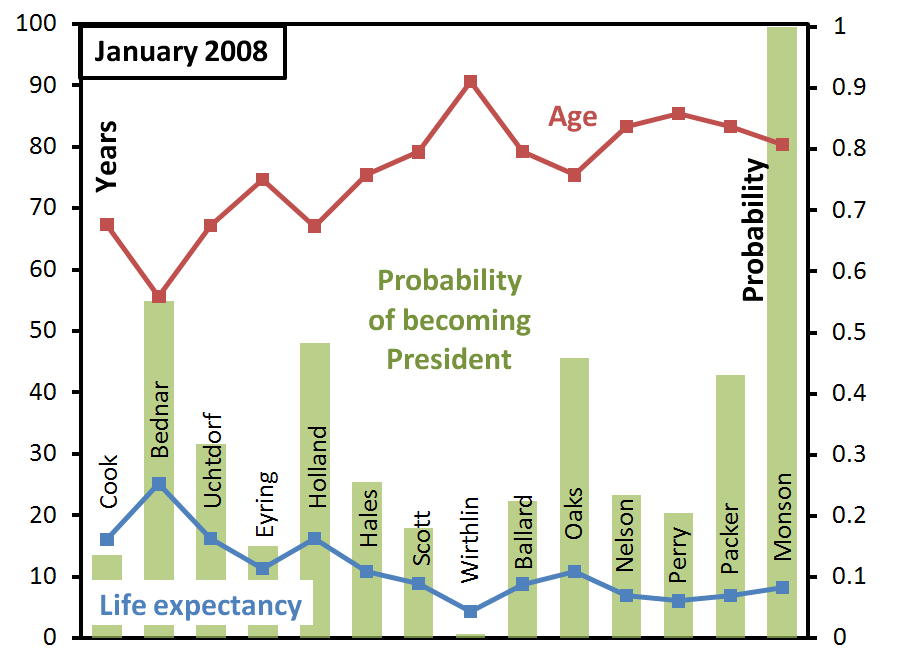
The hot new candidate was David A. Bendar, who followed the pattern of being far younger than anyone senior to him when he was called. The difference was larger for him partly because he entered the Quorum after a long period of stability. For nearly a decade, nobody in the Quorum had died, meaning that they were all aging together. Elder Bednar was young when he was called (52.4), but not dramatically different from the ages at which Elders Oaks (51.8) and Holland (53.6) were called. Entering after a long period of stability, though, gave him a higher probability at entry than Elders Oaks or Holland had.
Finally, here’s the Quorum as of September 2009. This corresponds to the table at the beginning of this post.
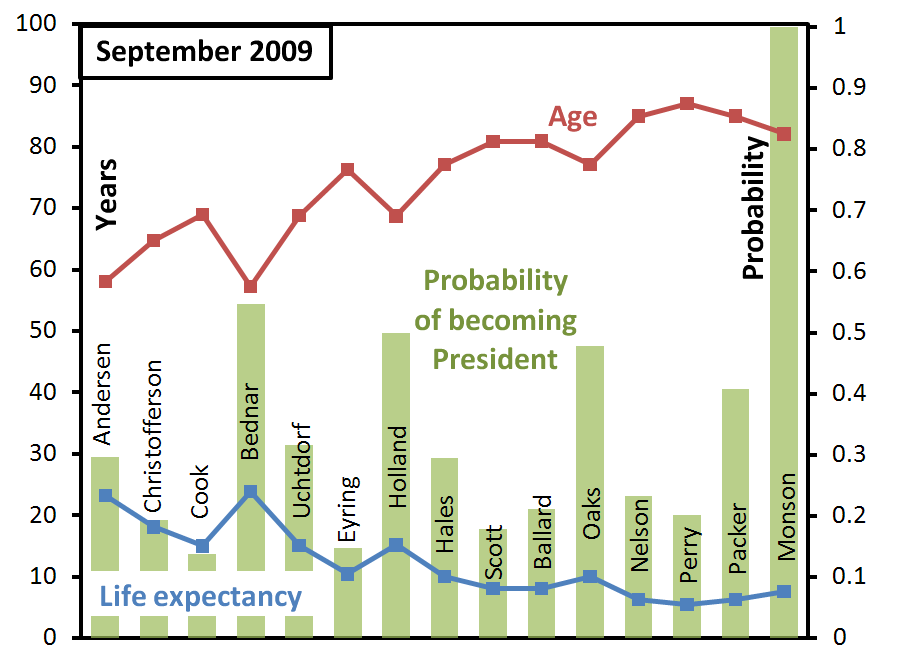
Not a whole lot has changed since President Monson became President. One member to keep an eye on is Neil L. Andersen. He’s similar in age to Elder Bednar, although a little older. But other than Elder Bednar, he’s younger than everyone else, and in many cases (e.g., Quentin L. Cook, Dieter F. Uchtdorf, Henry B. Eyring), a lot younger. So if he were to outlive Elder Bednar, he would be a really good candidate to become President. Of course, it will likely be a few decades before we know if that’s going to happen or not.
This is the end of the fun part of the post. If you’re interested in how I came up with the life expectancies and probabilities of becoming President, read on. If not (and I wouldn’t blame you), skip down and make a comment. Suggested topic: Who are you rooting for to become Church President next?
Where do these probabilities come from? I’m glad you asked. I figured them using a three-step process.
First, I found birth, calling, and (where applicable) death dates for every member of the Quorum since its organization in 1835. (These came from the very helpful site ldsfacts.net.) I rounded all dates to the nearest month to avoid having to deal with issues like leap years. Then, I looked at life expectancy tables for White American men to determine each Quorum member’s life expectancy in each month of his life. For life expectancies for years from 1900 to the present, I looked at the United States Life Tables 2004 (Table 11), issued by the CDC’s Division of Vital Statistics. For life expectancies from 1850 to 1900, I looked at the book Historical Statistics of the United States, specifically table Ab656–703: Expectation of life at specified ages, by sex and race: 1850–1998.
Of course neither of these sources gives life expectancies for a man of an age specified in months. They also don’t give life expectancies for every year, but only about once a decade (e.g., 1920 but not 1923 or 1917). For example, they could tell me that a White man who was 50 in 1950 had a life expectancy of 24.70 years, but they couldn’t tell me his life expectancy if he was 51, or if it was 1954. Another problem was that the tables didn’t go far enough at either end–they only reached back to 1850 and forward to 2004.
I solved both of these problems by assuming linear change between values in the table. I did this both to estimate between ages and between years. For example, to find the life expectancy of a Quorum member who turned 50 in 1955, I found his life expectancy if he had turned 50 in 1950 (24.70) and if he had turned 50 in 1960 (25.57). Then, since 1955 is halfway between 1950 and 1960, I went halfway between 24.70 and 25.57 and estimated his life expectancy as 25.135. The process worked the same way when working between ages. For example, to find the life expectancy of a Quorum member who turned 52 in 1940, I found his life expectancy if he had turned 50 that year (23.26) and his life expectancy if he had turned 55 that year (19.47). Then, since 52 is 40% of the way from 50 to 55, I went 40% of the way from 23.26 to 19.47 and estimated his life expectancy as 21.744. Naturally, because most Quorum members don’t have round number birthdays that matched round number years, and because I was refiguring everyone’s life expectancy once for each month of his time in the Quorum, I had to use this method to estimate both between years and between ages for almost all life expectancy estimates.
I used a similar process to estimate life expectancies for years outside the tables. For years more recent than the end of the newer table (2005-2009), I took the change between the two most recent years in the table (1990 and 2004) and projected them out as a line. For years before the earliest years in the older table (1835-1849), I took the change between the two oldest years (1850 and 1860) and projected them back as a line.
Second, once I had an estimated life expectancy for each Quorum member, I wanted to represent variability in his possible life expectancy. For example, someone having an estimated life expectancy of 20 years could live 2 more years, or 15, or 35. A life expectancy of 20 just means that’s the average of the possibilities. To simulate this variability in possible life expectancy, I drew 1000 random numbers based on the Quorum member’s life expectancy. As with finding life expectancies, I repeated this for each month of each Quorum member’s time in the Quorum.
Random values were drawn from a Weibull distribution having a shape parameter of 2.1 and a scale parameter chosen, in conjunction with the shape parameter, to give the distribution an expected value equal to the estimated life expectancy. The value of 2.1 for the shape parameter was chosen because it gave the best fit between predicted probabilities of becoming President and actual probabilities.
Third, once I had these 1000 possible life expectancies for each Quorum member in each month of his time in the Quorum, I put them together to see what they implied for how the Presidency would pass from one member to another. For example, just looking at part of a Quorum, consider the four most senior Quorum members at the moment–Thomas S. Monson, Boyd K. Packer, L. Tom Perry, and Russell M. Nelson. So if the random number draw yielded the following life expectancies:
- Monson: 8.9
- Packer: 6.2
- Perry: 7.1
- Nelson: 5.5
this would suggest that President Packer, Elder Perry, and Elder Nelson will not become President of the Church (since President Monson will outlive them all). If, on the other hand, the random number draw yielded these life expectancies:
- Monson: 5.0
- Packer: 3.9
- Perry: 10.7
- Nelson: 12.1
this would suggest that President Packer would not become President of the Church (since President Monson would outlive him), but Elder Perry would (since he would outlive President Monson), as would Elder Nelson (since he would outlive Elder Perry). Of course, the first set of random number draws is more likely than the second, given that President Monson is the youngest of the four.
Anyway, I repeated this process 1000 times for the Quorum as it existed each month from March 1835 to September 2009 (2095 months). So for any Quorum member in any month, his predicted probability of becoming President estimated in a particular month is simply the proportion of the 1000 scenarios (based on the random number draws, which are based on every member’s life expectancy) in which he outlives all Quorum members senior to him. For Elder Bednar in September of 2009, he became President in 546 of 1000 scenarios: 546/1000 = 0.546, which rounds to 0.55, or 55%.
Assumptions
In doing this particular analysis, I’ve made a number of assumptions:
- I’ve assumed that the historical pattern of having the senior member of the Quorum take over as President when the previous President dies will continue to be followed.
- I’ve assumed that all Quorum member’s life expectancies can be described by a single distribution. Of course this is false, given that with more information about their medical condition, more precise predictions could be made. But I don’t think it’s a bad approximation.
- I’ve assumed that members will only leave the Quorum through death. This certainly wasn’t true in the first few decades after the Church was organized, but given that the most recent exit by a means other than death was over half a century ago (Richard R. Lyman in 1943), it’s probably not too far off.
- I’ve assumed that Quorum members’ life expectancies are independent of one another. In other words, I’m not accounting for any lengthening (or shortening) of life that might take place when a member rises to the Presidency–or takes any other position in the Quorum, for that matter. (For a way that this assumption might go wrong, see this comment by Matt W.)
- Obviously I’m assuming that life expectancies follow a particular distribution (Weibull), and of course there’s no way that’s exactly true. But that distribution is frequently used for survival analyses like this, so it’s probably not a bad choice.
- In doing all that linear interpolation and extrapolation, I’m assuming that change in life expectancy from year to year or age to age is linear. While it probably isn’t, it’s likely not far off. For instance, if life expectancy for a 50 year old is 23.26 and life expectancy for a 55 year old is 19.47 (as they were in 1940), then life expectancy for a 52 year old may not be exactly 21.744 as I estimated, but it’s more likely that than something outside the range of the age 50 and age 55 life expectancies, like 15.5 or 34.2.
The root mean square error (RMSE–the square root of the average squared prediction error) in probability was 0.36, so a member who didn’t end up becoming President was on average estimated to have a 0.36 probability and a member who did end up becoming President was on average estimated to have a 0.64 probability. This doesn’t sound too good, I know, but this fit is actually much better than, for example, simply guessing that every member will die at exactly his life expectancy and working through who would be President or not. Using that approach, all predicted probabilities are zero or one (i.e., not President or President), and the RMSE was 0.55.
Note that for both of these calculations, I excluded living Quorum members other than President Monson, since it is as yet unknown whether they will end up becoming President or not. I also excluded all predictions based on months during Joseph Smith’s tenure as President, since so many Quorum members left by excommunication then, and I was more interested in finding good fit for the current norm of having Quorum members leave only by death.
Wouldn’t your life expectancies be more accurate if you simply measured each man’s blood pressure, glucose tolerance, and cholesterol? 😉
More seriously, what sort of data could you get for the lifespans of their fathers, uncles, older brothers, and grandfathers? Would that have predicted, for example, President Lee’s early death?
And on a side note: how weird would it be to read an article discussing your life expectancy?
One last note: once again, your graphics need no legend for comprehension. I do wonder, however, why you placed the y-axis labels on top of the graph instead of to the sides?
As usual, very interesting. I am glad that someone enjoys crunching this data, because I like reading the results!
I see that you based life expectancy on an average American white males. Are German life expectancies much different?
Also, do we have any feel for whether apostles lead relatively healthier, unhealthier, or average lives? Just wondering.
Is there a point to this?
Go Elder Oaks!!
yeah, the point is that the hyper-orthodox apostles like Bednar will be leading the church for a long time to come. Expect more retrenchment and the big tent continuing to shrink for Liahona members.
Brian, good questions. I suspect that you’re right that you could build a better model with information about risk factors like family history of heart disease, etc. I guess with this I just got interested in the question of how far you could get by just looking at a single variable age. But it could definitely be improved.
Regarding y-axis labels inside the figures instead of outside, I’ve done that because the blog format means I’m always pressed for horizontal space. I could always make a big tall graphic (in theory anyway) but I can’t make a really wide one because of the limits of the sidebars (and the fact that we don’t have a cool “liquid” theme that stretches to fill wide monitors). So with that constraint, I have to fight for every pixel of horizontal space, and I figure the label doesn’t justify the space if it’s all alone outside the figure.
ESO, good question about Elder Uchtdorf–definitely by using US data I’m making a simplifying assumption. I doubt that German life expectancies are too different, but I really don’t know.
Also I think you raise a great question about whether apostles live generally healthy lives. I suspect that by being faithful Church members and avoiding tobacco, they’re probably healthier than average. Also, there’s some selection effect going on: they have to be healthy into (generally) their fifties or sixties to even be called. So a man who dies, or even gets seriously ill, before that age is likely to not even be called. I don’t have a sense, though, of whether they are healthier than, say, other Church members of similar ages. I would guess their constant travel doesn’t do their health any favors, for one thing.
Phouchg, Elder Bednar wouldn’t necessarily be my first choice either, if I were doing the choosing. But President Lee’s early death really highlights the fact that reality can be unpredictable. Maybe President Uchtdorf will live to be 110. 🙂
Thanks, Ziff! This is fabulous (and way more than meaningful than what I had proposed the last time we discussed Quorum aging.
That Oaks is most likely to directly succeed Monson is interesting, not least because their personal tone and manners of thinking/speaking vary greatly. The shift in style from Hinckley to Monson was noticeable but not huge, but I would think the change from Monson’s highly empathetic to Oaks’ very legalistic style would be quite stark.
As for Ray’s question on why it matters (besides the obvious test of whether Ziff is a prophet), I can think of an example:
That Oaks has been given the lead in discussing issues surrounding the Church and homosexuality means that should he ascend, there will likely be a very critical look from without and within at the statements he’s making on a major social and political issue that is unlikely to subside anytime soon. He’s recently articulated several thoughts, such as that homosexuality exists in this life only, which would likely gain more authoritative doctrinal status were he to become prophet.
That statement in particularly is interesting to me in light of the “same spirit will rise with us in the resurrection” scripture because it defines a clear view of homosexuality: that homosexual feelings are a product of the flesh and not the spirit, and that they’ll disappear in the afterlife.
I love Christ, my wife, and my son, and presumably will stay that way in the afterlife, but by Oaks’ assertion, a man who loves another man will apparently lose those feelings once the physical “gay gene” is gone. Science may support or critique that view in the future, and I think it has important ramifications for understanding the nature of our body and Spirit: Why is homosexuality different eternally from other feelings of love, belief/unbelief, anger, etc. that we attribute to our spiritual nature (but which could have genetic/physical underpinnings)? This is, in my mind anyway, quite doctrinally significant.
Although it may be in poor taste to root for someone to outlive someone else, I concur that this post is enlightening. Thanks, Ziff. You continue to amaze.
Thanks for this interesting look at succession.
SW Clark,
Science has basically debunked the ‘gay gene’ already. I don’t think a lot of people take stock in that statement, unless you are an entrenched conservative, orthodox Christian. It is an interesting thought though, about what feelings, sexual or not, will rise with us.
Thanks, SW Clark, for articulating a very good reason to care about who gets to be President and who doesn’t. I pretty much fiddle with stuff like this because I find it entertaining, but you make an excellent case for why this actually might matter.
I agree with you that Elder Oaks would be dramatically different from President Monson. So, setting aside what’s likely or not, who in the Quorum would be most like Presidents Hinckley and Monson?
.
Ziff. You must be the coolest statistician in the world.
Thanks, Th!
Of the current quorum, I think L. Tom Perry would perhaps be closest to Hinckley and Monson in character. He can speak forcefully or gently, tell stories pretty well, and just generally makes you feel good. From the two times I’ve met him he seems like that loving, respectable and fun grandpa that we’d all want to have. That, and for some reason I feel like he could give one heck of a big bear hug.
dallske – I don’t take stock in the “gay gene” argument either, which is why it’s hard to figure how a gay spirit could change once out of the body. On the other hand, there are other things about our personalities that are driven by hormones and chemical reactions in imperfect bodies, and which might impact choices we have made in life (including sin and acceptance of the gospel). So what’s the true nature of our “same spirit” that will rise? I wonder…
Great analysis, as always.
I have posted/commented on this before, and I will say it again. I believe Elder Oaks will be President Monson’s immediate successor.
Interesting, I once did a simplistic “If they die in the order they were born” back of the envelope analysis and got the same results.
While the line of Monson-Oaks-Holland-Bednar seems pretty set in stone, there are some chances for short Packer, Hales, and Uchtdorf Presidencies.
That’s interesting that you got the same result, Matt. I’m too often the type to try to kill a fly with a grenade, statistically speaking. But it’s actually kind of comforting to know the results are parallel; it gives me more confidence that I didn’t get way off somewhere and not notice it. 🙂
Also, regarding Elder Oaks, he’s clearly the most likely next in line, but it’s interesting that (assuming you can take my estimates at face value), it’s more likely than not (64%) that at least one of the three men who separate them will be President first (or perhaps in place of).
But Kim, I think you’re definitely right that Elder Oaks is the single most likely next President.
Ziff, very very interesting stuff, and some really nice work. Clearly however you have not accounted for the white horse prophecy placing Aaron Brown at the helm in 2012.
Very nice, Ziff.
“Who are you rooting for to become Church President next?”
Oh please no. There are few things more repugnant than that conversation.
Very interesting reading! You always blow me away with how your mind works. Did you study at Hogwarts?
Steve’s right. And FYI, once I’m prophet, I am TOTALLY bringing back the Adam-God Theory and seerstones.
Frank, sounds like you took the over/under on Cook.
Related to the question of Ziff’s life expectancy (comment #1) is the question of when he will post next. Fortunately, we have a good data set (at https://zelophehadsdaughters.com/author/ziff/ ) which allows us to make some calculations. If we use 2009 numbers on Ziff Post Gaps (ZPG’s), we see the following:
Date of post ….. Days since last post
January 7 ……….n/a
March 1…………… 52
March 16 ………. 15
April 11…………… 26
May 6……………….. 25
July 3……………….. 58
August 21…………..49
August 31…………..10
September 4 ……….4
September 8 ……….4
September 11……….3
September 24……..13
October 14………. 20
—
Mean: No, they’re all actually quite friendly.
Standard deviation: Not really — Ziff does make subversive arguments from time to time, but not Kiskilili-level or anything.
—
Notice that there are four distinct clusters here:
VSGZP (very short gap Ziff posts): these posts have a 3 or 4 day gap
SGZP (short gap Ziff posts): these posts have a gap of between 10 and 15 days
MGZP (medium gap Ziff posts): these posts have a gap of between 20 and 26 days
LGZP (long gap Ziff posts): these have a gap of between 49 and 58 days
Of the 12 posts with 2009 posting gaps, the percent of each is as follows:
VSGZP: 3 (= 25%)
SGZP: 3 (= 25%)
MGZP: 3 (= 25%)
LGZP: 3 (= 25%)
That is, there has been a perfectly even distribution among the categories of VSGZP, SGZP, MGZP, and LGZP.
This can be illustrated in the following basic chart:
|…………………………….| 50%
|…………………………….|
|…………………………….|
|….^…. ^….^…..^…..| 25%
|…..^….^….^…..^…..|
|__^__^__^__^__|
…..VS….S…..M…..L
Based on these calculations, Ziff’s next post has a perfectly even likelihood of being a VSGZP, a SGZP, a MGZP, or a LGZP.
That is, if it follows existing 2009 trends, it will either take place between October 18 and 19, between October 25 and 30, between November 4 and 10, or between December 3 and 12.
If Aaron Brown becomes prophet I want to hear a lot of great missionary stories from the pulpit.
Man, I can still find this on the internets.
Uh-oh, Kaimi. You have me figured out! Truth be told, I’m using a random number generator to decide when to write a new post. 🙂
Aaron, I was hoping that when you were prophet you would bring back free agency and do away with moral agency.
Oh, and Idahospud, I did attend Hogwarts, but I was in Slytherin house. I didn’t want to be, but who can doubt the wisdom of the Sorting Hat (who, by the way, my model suggests has a less than 1% chance of becoming the Minister for Magic)?
@ #5 – what defines a ‘Liahona’ member? And I’m curious how Elder Bedner is more ‘orthodox’ than other apostles?
Once again Ziff, awesome.
Ziff, this is great! Thanks for the awesome analysis. It’s interesting to speculate what differences there would be to the church under various presidents. My two favorite apostles, Uchtdorf and Eyring, don’t seem to be terribly probable. But I don’t want to wish any bad things to happen to those ahead of them, so I’ll hush. =)
Thanks, E. Thanks, Tatiana. Regarding Presidents Uchtdorf and Eyring, at least they’re getting to serve in the First Presidency, I guess. One thing my analysis completely ignores is the fact that Quorum members can have a big influence by doing that, even if they don’t serve as President. J. Reuben Clark, I think, is the classic example.
Cameron, I believe the term “Liahona” member comes from Richard D. Poll’s Dialogue article in which he contrasted two types of members, which he called “iron rod” and “Liahona” members. Here’s a link to the article.
Regarding Elder Bednar being more orthodox than other Quorum members, I haven’t done any kind of real analysis, but I think he tends to emphasize things like General Authority inerrancy (not using that term of course) and obedience over other themes.
Interesting! I’d be curious to see a post about mortality rates for apostles’/prophets’ wives, which seems unusually high to me–with women statistically outliving men, it seems like a larger than normal number of the current/recent apostles and prophets have been widowed. Could it be the stress of supporting that position?
I always assumed that the Church realized that Elders Oaks and Holland are the two most likely next Prophets and that is why the two of them were chosen to serve outside the US in the Phillipines and Chile/Peru (?) respectively. I think this was a pretty cool thing for the next two potential prophets to have an international experience. Any bets on where Elder Bednar will be sent?
Can you use these data to predict the order of presidents over, say, the next 50 years and how long they will serve?
I always figured Monson had a high probability of becoming prophet. However, I always hoped they would choose someone else. I still don’t really like him.
After this week’s press, I think Oaks would have to answer for a lot as prophet but not as much as Packer.
I am rooting for Bednar.
Wow, looks like “we” have become the judges of Prophets. For those who have read the scriptures, how does that go over?
I was doing this exercise in my head during the last GC – and feeling guilty about it – (who will die next?!) Glad to see I’m not alone.
BTW, if your calling to the Holy Apostleship comes before you’re 60 – bank on the presidency.
uh…make that 50…
Our Sunday School teacher discussed succession as part of last week’s lesson and asked something like, “if the Lord continues to designate his choice for leading the church according to the established pattern, what about apostles who might have greater seniority?” One woman blurted out, “He kills them!”
You’d have to know the woman to appreciate that she meant nothing disrespectful or crass or in any way distasteful. She’s an elderly woman with not a particle of guile in her, and has the knack of saying outrageous things in pure innocence, what other people might be thinking and trying to phrase diplomatically. She’s one of the eccentrics in my ward whom I just love.
From Time, Nov. 28, 1960:
“Apostle Smith is next in line for the presidency of the church, now held by David O. McKay, 87, by virtue of his seniority in the Council of the Twelve. Cracks Smith: ‘Think of all the Mormons who have to die before a man gets to be president.'”
Joseph Fielding Smith was ordained an apostle on 7 April 1910 at age 33 and became president after David O. McKay died on 23 January 1970. So nearly 60 years in the line-up, eighteen on deck as President of the Quorum of the Twelve. In addition, at the time the quote was printed, the eleven apostles called immediately after him had already died, as well as four others. He had seen the combined membership of the Quorum of the Twelve and the First Presidency turn over twice.
One of the things I like about the JFS quote is that he is joking about whether he or Pres. McKay will die first. I like the confidence of that. Maybe President Monson and Elder Packer make jokes like that too.
I was a seminary student ~1968 when it occurred to me that Elder Benson could become Pres. Benson at some time. This being the 1960s and me being in SoCal, this sparked some brooding contemplation me. After a few weeks, my ah-ha insight was that if he did become LDS Pres., I wouldn’t have put him there — and I’d best remember who did.
.
A decade later, as a married student at BYU, I heard him in a devotional. He didn’t seem to be the raving rightist that I’d reared earlier but I felt that we likely would be spending a lot of time reading the BoM and gardening if he became LDS Pres. This proved to be true — reading the BoM anyway — and he proved to be a gentle leader. I continue to carry the greater appreciation for the BoM I gained then.
.
An experience with another purported arch-conservatife, Joseph Fielding Smith came as a freshman at BYU when I heard him speak at a devotional there. His singer-wife, Jessie Evans Smith favored us with a beautiful number — accompanied by her doting, hesitant husband. He called their duet a “do-it” in his remarks, possibly presaging SWK’s dictum later that decade. He also turned out to be a kind man working hard to do the Lord’s work.
.
The prophet’s mantle seems to cover personal quirks — or maybe God helps me to see more clearly the man who wears it.
Thanks for sharing your experiences, manaen. That’s what I hope for when I think of apostles who say things I’m not a fan of becoming President, that perhaps they’ll become a little more mellow before they get there (and hopefully I will too!).
Great post as always, Ziff.
Now if I can just find a way to pick the next winning Powerball numbers, I can retire and devote all of my free time to reading posts on the ‘nacle. 😉
Jettboy,
What are you talking about?
It’s my impression that Elder Bednar’s description of church critics as consciously choosing to be offended is a major factor in his perception as a hardliner or as particularly orthodox or stringent.
Kris,
I need to hotkey your comment, so I can just hit Control-J and my computer will type, “Jettboy, what are you talking about?”
Other phrases to hotkey:
Control-A: “Great discussion, Ardis — I had no idea that this person even existed.”
Control-Z: “Awesome charts and stats, Ziff. I don’t know how you do it.”
Control-K: “Excellent explanation of the original Greek, Kevin — that makes lots of sense now.” (Substitute Julie Smith for Kevin as necessary).
Control-E: “Very good legal analysis, ECS.”
Control-F: “Frank’s comment is incorrect on every one of its substantive points.”
Control-W: “What a wonderful story, Wilfried. When are you going to put them all in a book?”
I love stuff like this. Neat analysis. I admit I am partial to Uchtdorf. He seems “prophety” to me.
I ran the numbers to show by year who is likely to be the president of the church. You can see the chart at http://mohohawaii.blogspot.com/2009/10/changing-of-guard.html
What I find remarkable about these numbers is that there is a 70+% that either Packer or Oaks will become president of the church. I can’t imagine what this will be like.
Great stuff, MoHoHawaii!
If anyone’s reading this thread and wants to see clearer and more to the point figures on this topic, definitely check out MoHoHawaii’s post. His first figure in particular shows for the next several decades the probability at each point of each current apostle being President of the Church.
Ronan (#35)–sorry I didn’t come up with an answer to your question, but I think MoHoHawaii’s figure might answer it.
Kaimi,
I never realized Elder Bednar’s awesomely plain and precious talk in being offended was so offensive to some. But I guess that’s the point of the talk. You get to decide how you respond. I agree with his words and sentiment whole heatedly, even though (especially because?) I find myself “taking offense” many times throughout the week and have to remind myself to dial it back.
If anyone is offended by what he said the probably need some reflection.
At the same time, I distinctly remember the impression when I was EQ pres and having this lesson taught to our quorum that I need to point out this lesson was not an excuse to continue doing things that offend people and then simply chalk the responsibility for the mistake on the offended — we have to do our best not to cause offense to others, but at the same time not get offended.
It’s a strange contradiction, but it’s somewhat like being married. 50/50 arrangements where the relationship and effort is tit for tat aren’t very robust, but the marriage seems to work a lot better if you’re willing to put in 90% while not expecting 90% (or even 50%) in return from your spouse. And vice versa.
Phew… now I’ve said my peace.
Late to the game, but #3 is NOT me. Please use a different handle if you still are around, since “Ray” has been mine for a long time – and everyone will assume you are me.
Fascinating numbers. I would like to see Elder Bednar and Elder Andersen as future Presidents.
So Richard Evans was the apostle with the best chance of being prophet, but didn’t make it, and maybe Kimball was the biggest “long shot” that made it?–though he really wasn’t that much of a long shot. I know we like to talk about Pres. Kimball as being “preserved”, would Evans be a case of early pruning?
I for one appreciate the clarification, Ray. I was wondering when you turned into a pill.
Evans: “All I get to be remembered for is a quote book.”
I like the post and analysis. I wish there was some better way to quantify health. Perpetually tan and fit Uchdorf seems so much younger than Holland. And Elder Packer seems to be failing quickly (although I’m enough of a hard-liner that I’d actually look forward to a Packer presidency.)
Re:34 I think the Church sent Holland and Oaks to overseas not because they were likely presidents, but because they were young enough to be active and handle the living conditions and workload. (Similar to why Elder Benson was chosen to go to Europe in 1945).
Why use Weibull as an approximation? Why not just look up on a mortality table the fraction of people of each given age that die each year (this is the underlying data from which “life expectancy” is derived) and simulate the future using these actual probabilities?
Good question, Timer. I guess it was just easier to use a ready-made distribution than figuring out the real one from the data.
Ben, that illustrates perfectly the difficulty in discussing this situation: when an apostle lives long enough to become the president, people speak of him as being preserved by the Lord to be prophet. But the corollary is not so pretty: if an apostle doesn’t live long enough to be prophet, does that mean that God shortened his life? I think not.
I’m too often the type to try to kill a fly with a grenade, statistically speaking.
This made me laugh out loud.
I think these analyses are fun. Thanks. Makes me wish I had gone with plan whatever-it-was to study stats in college. 🙂
Cross out Bednar. My mother in law thinks he is one of the two prophets who will be killed during Armageddon. Which is sad, because I really like him.
As Hunter says, there’s a corollary to “the Lord preserved him.” I’ll go ahead and point out the elephant in the living room – if Elder Lee had not died unexpectedly at a fairly young age, the church would probably be a lot different today, and perhaps significantly smaller. He was one of the apostles most opposed to extended the priesthood to all men regardless of race, and it’s my guess he would have been very unlikely to seek a revelation in the matter on his own. If the priesthood revelation had been delayed by another 10 – 15 years, (1993!) then I think it would have dramatically and negatively affected the church growth that was experienced in the boom-boom eighties.
Why was his death unexpected? Looking at the lifespans of his father, grandfathers, and great grandfathers (and I think I included one uncle in there too), Harold lived just slightly longer than the others.
Mean +/- SD = 64.7 +/- 9.8 yrs.
I don’t know whether his death was caused by something we might consider a genetic factor, but it’s worth considering before we conclude that his death was unexpected.
(By contrast, Gordon B Hinckley, who lived to 98 yrs, had a father who lived to 94 and a great grandfather who lived to 84 yrs: Mean +/- SD = 77.7 +/- 15.2 yrs.)
@ Dion, #34, “Any bets on where Elder Bednar will be sent?”
Israel.
Monson will serve .1 years longer than his life expectancy?
Yup, Steve, he’ll serve for a while as a zombie. 🙂 Actually, this difference arises because his life expectancy is a single estimate, while his “average years served” is the average of how many years he was expected to live across the 1000 runs of the simulation. With a lot more runs, the “average years served” would converge more reliably to the actual life expectancy, but I’m actually happy that it’s even that close.
How will we be able to tell?
#67. It’s pretty simple, really. Just make “delicious brains” the special phrase for the Sunday Morning Session and watch how fast the candy bowl empties.
At first I thought this was to predict the next Church Pres, which given the data would be Oaks; the most senior predicted to outlive Pres Monson. Of course, I predicted Bednar without all the science just the same as one could have predicted Monson when he was first called to the Quorum being a MUCH younger man than the others at the time of his calling. Nothing but simple science required.
I am glad to find out that I have been the only person in the Mormondom who played with “age of calling” and “seniority” of the Twelve to forecast a plausible line of future presidents. Although my calculation were far less sophisticated than yours, I got the same names down for possible successors (Oaks, Holland, Bednar). However, anything could dramatically reshuffle these predictions: President Monson could reach 100; Holland could get an incurable illness while still “young”; the Savior could be coming before the this decade or the next is over…
Anyway great post!
Wow–this made my head spin. Very cool stuff!
Ray, why would you like to see Bednar and Andersen become prophets?
Excellent work! I dont u.stand: May 94 chart…. Why was GBH listed as second in line, but his graph veritcal line (green) was next to the Prez?
I thought they listed in seniority order, L to R…
oops! make that order (as I thought) R to L!!!!
Hey Ziff! If you ever see this comment, I think we would all love a new analysis on this for 2013!
Thanks for coming by, Tyler. Unfortunately, I don’t think I have the energy to repeat the study now. Truthfully, though, I would be really surprised if the results would look much different from what they looked like in September, 2009. Everyone has aged a few years, but nobody has died, which is when the action really happens and the probabilities really get shuffled (for example if Elder Oaks died tomorrow, everyone behind him would see his probability of becoming President shoot up).
Here’s an updated chart. I’m not sure who put it together:
http://imgur.com/1JHZjBT
A friend of mine just sent me this python program that let’s you play around with projections and forecasts. Should be lots of fun without making more work for Ziff. 🙂
http://nbviewer.ipython.org/github/philngo/mormon-prophets/blob/master/prophet-calculations.ipynb
Nice, Dave! Thanks for the pointer!
Ziff, Is there any way you could update this to the present and include the information on popularity you had in a recent post?
Geoff, I’m definitely planning to update the analysis, but using standard actuarial tables this time, rather than trying to cook up my own. 🙂 I probably won’t do so, though, until someone in the Q15 dies, which is when the probabilities really move around.
On including the popularity information (you mean like the Facebook “likes”), how were you thinking the two would go together?
Here is an update using the latest actuary table from ssa.gov. I interpolated to monthly survivor rates, and ran 10000 sims updated on a monthly basis.
Thomas S. Monson 8/21/1927 Next Pres Future Pres
Russell M. Nelson 9/9/1924 42.0% 42.0%
Dallin H. Oaks 8/12/1932 29.0% 52.2%
M. Russell Ballard 10/8/1928 7.6% 24.0%
Richard G. Scott 11/7/1928 4.8% 19.6%
Robert D. Hales 8/24/1932 4.9% 26.8%
Jeffrey R. Holland 12/3/1940 6.3% 48.7%
Henry B. Eyring 5/31/1933 1.2% 13.8%
Dieter F. Uchtdorf 11/6/1940 2.0% 33.0%
David A. Bednar 6/15/1952 1.7% 61.3%
Quentin L. Cook 9/8/1940 0.2% 11.4%
D.T. Christofferson 1/24/1945 0.1% 18.6%
Neil L. Andersen 8/9/1951 0.2% 33.9%
oops, I see that Ziff has already updated his numbers.
Ziff, I don’t know how you would include popularity/likes. Hopefully all this will be turned on its head by the next Prophet not being the President of Q12 but Elder Uchtdorf chosen by the Lord.
MoHo Hawii I looked at your graph. Have you got all the ages 5 or 6 years younger than they are?
I wonder how Elder Scott affects the numbers now…
Probably just a ripple,looking at the numbers Ziff posted when Packer died…Holland becomes a touch more certain,I suppose.